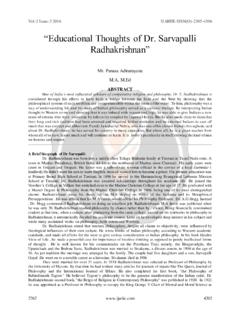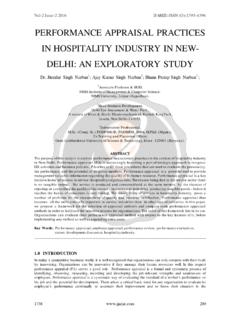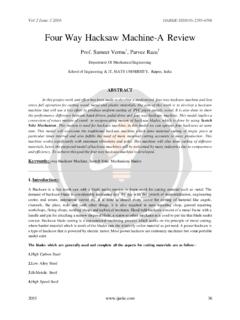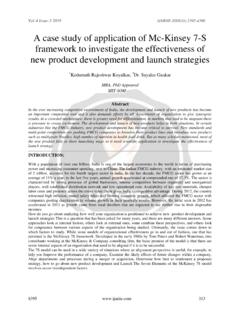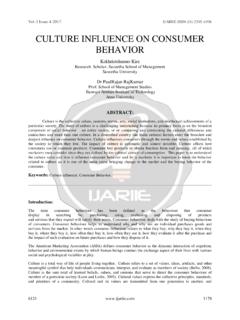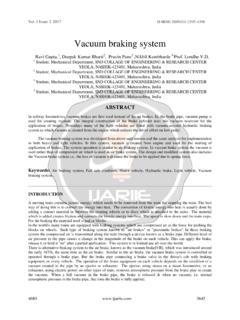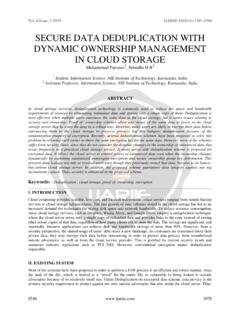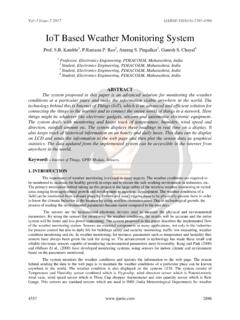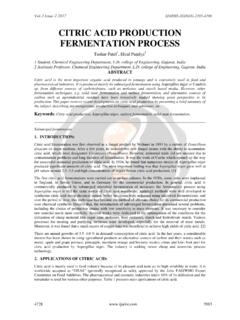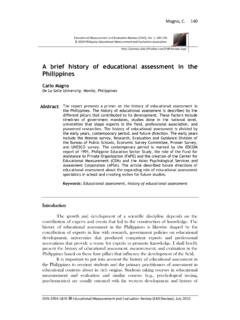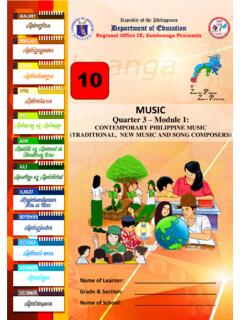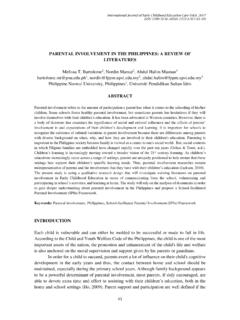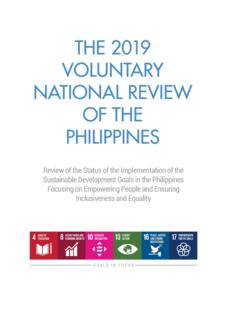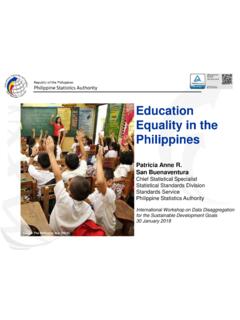Transcription of AMIDST COVID-19 PANDEMIC: THE SELF- EFFICACY AND …
1 Vol-7 Issue-3 2021 IJARIIE-ISSN(O)-2395-4396 14568 2230 AMIDST COVID-19 PANDEMIC: THE SELF- EFFICACY AND ACADEMIC MOTIVATION OF THE COLLEGE STUDENTS FROM THE PRIVATE HIGHER education INSTITUTIONS IN THE PHILIPPINES Micaiah Andrea Lopez1 Christian Dave Francisco2 Cristalyn Capinig3 Jhoremy Alayan4 Shearlene Manalo5 1-5 Research Students, Psychological Statistics Jhoselle Tus6 6 Professor, Psychological Statistics Jesus is Lord Colleges Foundation, Inc., Bocaue, Bulacan, Philippines Abstract Due to the COVID-19 pandemic, the academe was introduced to online education , which is complicated. The sudden shift of traditional face-to-face classes to digital learning impacted every student's self- EFFICACY and motivation towards their studies. This study iinvestigates the relationship between the self- EFFICACY and academic motivation of the 304 freshmen college students from private higher education institutions in the Philippines.
2 Based on the data gathered, the participants' level of self- EFFICACY (x = ) and academic motivation (x = ) is high. Further, the statistical analysis concluded a relationship between self- EFFICACY and academic motivation (r=.002, at level) among the graduating college students. Implications of the study were discussed, and recommendations for future research were suggested. Keywords: Self- EFFICACY , Academic motivation, Online learning, Freshmen College Students 1. INTRODUCTION Pandemic stopped almost everything in the world today. Every household faced challenges. Adjustments were also needed to be applied. Due to the COVID-19 pandemic, the world was introduced to online education , which is complicated. The sudden shift of traditional face-to-face classes to digital learning impacted every student's self- EFFICACY and motivation towards their studies. Kaplan-Rakowski (2020) explained that the students' mental wellness had been diminished because of the adjustment that they have to do due to online learning.
3 Also, it can increase their level of anxiety and depression. Even before the pandemic starts, some students doubt themselves about their academic potential. According to Alvarez (2020), students can voice their thoughts about shifting from traditional learning to online learning: and according to the answers, it is considered problematic and suicidal. They cannot learn from online platforms, but the needed devices are too much for them. Arik (2019) explained that academic self- EFFICACY and academic motivation are crucial factors in gaining academic achievement. Based on their findings, academic self- EFFICACY is related to academic motivation and is essential for attaining academic achievement. Thus, Mosier (2018) discovered that students with low self- EFFICACY lack motivation to strive for academic achievements. The findings of his study unveil that there was no significant difference between motivation and academic self- EFFICACY score.
4 Also, the environment does not cause a lack of motivation. Although statistically significant, results showed that a higher cumulative grade point average (GPA) resulted in a higher academic self- EFFICACY score. On the contrary, Kola, Jaafar, and Ahmad (2017) investigate the level of academic self- EFFICACY beliefs with students' academic performance. The results showed a significant relationship between academic-self EFFICACY beliefs and the students' academic performance. Hence, the student's ambition increases their level of academic motivation. Moreover, this study investigates the relationship between self- EFFICACY and academic motivation of freshmen college students from private higher education institutions in the Philippines. Vol-7 Issue-3 2021 IJARIIE-ISSN(O)-2395-4396 14568 2231 Research Questions This study investigates the relationship between self- EFFICACY and academic motivation of freshmen college students from private higher education institutions AMIDST the COVID-19 pandemic in the Philippines.
5 Moreover, this study sought to answer the following questions: 1. What is the level of self- EFFICACY of the respondents? 2. What is the profile of academic motivation of the respondents in terms of: intrinsic; extrinsic? 3. Is there a significant relationship between the respondent's self- EFFICACY and academic motivation? 2. REVIEW OF RELATED LITERATURE Self- EFFICACY Self- EFFICACY is associated with a particular activity for solving a problem rather than an overall evaluation of one's competence (Marsh, Pekrun, Parker, Murayama, Guo, & Dicke, 2018). Thus, people having a solid EFFICACY increases human accomplishments in many ways. Herpen (2017) explained the importance of recognizing early predictors of first-year academic achievement by investigating how academic self- EFFICACY affects 1st-year students' retention at university. However, it also contributed to transitioning literature from secondary to soaring education and the academic self- EFFICACY for going to a university.
6 Nonetheless, the study presented that having pre-university academic self- EFFICACY is not a proven predictor. Also, academic self- EFFICACY does not affect the first-year student's retention. Thus, Cho and Jung (2018) conducted a study to find general and social self- EFFICACY in peer collaboration subjects of first-year nursing students. The analyzed data concluded that communication was higher for extroverts. Females' social self- EFFICACY was more elevated than males', but the general social self- EFFICACY of the introverted and middle groups was higher than extroverts. It is also presented that those with average grades have higher social self- EFFICACY than those with grades. Previous research has compared the impacts of academic self- EFFICACY on college students (Highhouse, 2019). Results demonstrate that academic self- EFFICACY is not the cause of Academic success or persistence.
7 Additional exploratory analysis, chi-square tests, found no significant associations between the impact of gender, having a pell grant, Minority status, or belonging to an Academic Support Program on Academic success and persistence. Likewise, Girelli, Alivernini, Lucidi, Cozzolino, Savarese, Sibilio, and Salvatore (2018) explored a better understanding of the students' academic adjustment in the first year of education by testing a diagnostic model based on SELF- determination theory with the inclusion of self- EFFICACY . According to our findings, to promote a higher degree of academic adjustment in first-year students, interventions should encourage autonomous motivation and self- EFFICACY through independent supportive behavior from the university and the family contexts. Futhermore, Pasana, Badua, Manaois, Retuya, Bernardo, and Camara (2020), determines the college student's self- EFFICACY in chosen philippine Higher education Institution and the complete execution of the K to 12 primary education and differentiate it from the student's self- EFFICACY outcomes in secondary schools to render a new perception.
8 Also, students in the three universities in the Philippines. They were K-12 BEC graduates. However, the graduates of secondary schools should have higher self- EFFICACY to continue their tertiary education program. The college students who were graduates of K-12 stated that they are very assured of self- EFFICACY areas' measured study. Therefore, it intended to consider and determine the students' way to improve their self- EFFICACY . According to Cardullo and Lin (2018), English language proficiency is a significant challenge for students that affects their academic success. Previous research indicates self- EFFICACY positively English language proficiency and academic achievement. The structural equation model shows that English self- EFFICACY indirectly influenced international students by using English to learn self- EFFICACY . According to Tian, Yan, and Wang (2018), Self- EFFICACY increased academic performance.
9 This study investigates the effects of Synder's theory-based group hope therapy in first-year students. First-year students are randomly recruited and assigned into two groups: the intervention and control groups. The intervention group showed improvements in their academic self- EFFICACY beliefs, benefitted from Synder's theory-based group hope therapy. Pondang and Paterno's (2020) examined the mathematics enrichment program's influence on college students' self- EFFICACY in a philippine university. It was conducted to implement the said programs to allow students to participate in workshops, extended learning time, and review classes and tutorials to those who have very low self- EFFICACY . As a result, the students admit the significance of Mathematics, which supports them, and they are willing to go deeper in studying it and how can they apply it in their life.
10 Vol-7 Issue-3 2021 IJARIIE-ISSN(O)-2395-4396 14568 2232 Meanwhile, Castles (2019) proposes that self- EFFICACY can influence student's choice of activities; effort expended, persistence, interest, and achievement. The research then shows that male students and low-SES are those who usually have low self- EFFICACY . The study's purpose was to find out the difference between general self- EFFICACY and self- EFFICACY in online learning. There was no significant outcome of gender on general self- EFFICACY . This research also includes implications for future researchers for this research and has limitations. Ramnarain and Ramaila (2018) investigated the self- EFFICACY of first-year chemistry students at a South African university. This study's findings indicate that students scored more intensely on the self- EFFICACY constructs of cognitive and psychomotor skills than on daily application.
